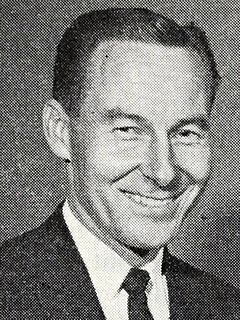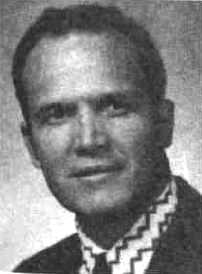In the Latter Day Saint movement, an apostle is a "special witness of the name of Jesus Christ who is sent to teach the principles of salvation to others." In many Latter Day Saint churches, an apostle is a priesthood office of high authority within the church hierarchy. In many churches, apostles may be members of the Quorum of the Twelve and First Presidency of the church. In most Latter Day Saint churches, modern-day apostles are considered to have the same status and authority as the Biblical apostles.
Seventy is a priesthood office in the Melchizedek priesthood of several denominations within the Latter Day Saint movement, including The Church of Jesus Christ of Latter-day Saints. Traditionally, a Latter Day Saint holding this priesthood office is a "traveling minister" and an "especial witness" of Jesus Christ, charged with the mission of preaching the gospel to the entire world under the direction of the Twelve Apostles. Latter Day Saints teach that the office of seventy was anciently conferred upon the seventy disciples mentioned in the Gospel of Luke 10:1-2. Multiple individuals holding the office of seventy are referred to collectively as "seventies".
In the Latter Day Saint movement, patriarch is an office of the priesthood. It is considered to be either an office of the patriarchal priesthood or the Melchizedek priesthood.
In the Community of Christ, the Council of Twelve Apostles is one of the governing bodies in the church hierarchy. They are disciples who hold the priesthood office of apostle, and are responsible for the evangelistic witness of the church. Apostles are also high priests in the Melchisedec priesthood of the church.
In the Community of Christ, formerly the Reorganized Church of Jesus Christ of Latter Day Saints, priesthood is God's power and authority to minister in the church and to conduct God's business on the earth. Although the church believes that all Christians are called by their gifts and talents to the ministry, priesthood is seen as a particular expression of universal ministry to which all are called. In the Community of Christ, both women and men can be ordained to the priesthood. All offices are deemed equal in importance, but the duties and responsibilities of each differ.
In the Latter Day Saint movement, the Quorum of the Twelve is one of the governing bodies or (quorums) of the church hierarchy organized by the movement's founder Joseph Smith, and patterned after the twelve apostles of Christ. Members are considered to be apostles, with a special calling to be evangelistic ambassadors to the world.

Robert Leatham Simpson was a general authority of The Church of Jesus Christ of Latter-day Saints from 1961 until his death.

George Homer Durham was an American academic administrator and was a general authority of The Church of Jesus Christ of Latter-day Saints from 1977 until his death.

Floyd Melvin ("Mel") Hammond was an Idaho politician and has been a general authority of The Church of Jesus Christ of Latter-day Saints since 1989. He was the nineteenth general president of the church's Young Men organization from 2001 to 2004.

Paul Palmieri was the president of The Church of Jesus Christ (Bickertonite) from 2005 to October 13, 2018.

Quentin LaMar Cook is an American lawyer, business executive, and religious leader who is currently a member of the Quorum of the Twelve Apostles in The Church of Jesus Christ of Latter-day Saints. Currently, he is the eighth most senior apostle in the church.
The Church of Jesus Christ (Bickertonite) is part of the Latter Day Saint movement. When Joseph Smith, the founder of the movement, died there was a dispute regarding who should lead the church as his successor. The Quorum of the Twelve, led by Brigham Young, argued that they should have the right to lead the church while one of the church leaders, Sidney Rigdon, argued that he should act as protector of the church until a permanent leader was chosen. Those who followed Rigdon formed the "Church of Christ" with its center being Pittsburgh, Pennsylvania. After an attempt to start a communitarian society, Church of Christ broke apart by 1847. William Bickerton associated himself for two years with The Church of Jesus Christ of Latter-day Saints and later left them behind refusing to accept some of their beliefs, including polygamy. In the 1850s Bickerton's preaching led to the formation of a new church in Eastern Pennsylvania. Over the following years Bickerton's church faced two schisms related to doctrinal issues. Its current official name, The Church of Jesus Christ, was adopted by 1941.
Lynn Grant Robbins was a co-founder of Franklin Quest Company and has been a general authority of The Church of Jesus Christ of Latter-day Saints since 1997. He was a member of the church's Presidency of the Seventy from 2014 to 2018.
Jay Edwin Jensen has been a general authority of The Church of Jesus Christ of Latter-day Saints since 1992. He served as a member of the church's Presidency of the Seventy from 2008 to 2012. Jensen was designated an emeritus general authority in the October 2012 general conference.
Seventy is a priesthood office in the Melchizedek priesthood of The Church of Jesus Christ of Latter-day Saints. Traditionally, a member of the Church holding this priesthood office is a "traveling minister" and an "especial witness" of Jesus Christ, charged with the mission of preaching the gospel to the entire world under the direction of the Twelve Apostles. The Church teaches that the office of seventy was anciently conferred upon the seventy disciples mentioned in the Gospel of Luke 10:1-2. Multiple individuals holding the office of seventy are referred to collectively as seventies.

An apostle, in its most literal sense, is an emissary, from Greek ἀπόστολος (apóstolos), literally "one who is sent off", from the verb ἀποστέλλειν (apostéllein), "to send off". The purpose of such sending off is usually to convey a message, and thus "messenger" is a common alternative translation; other common translations include "ambassador" and "envoy".






